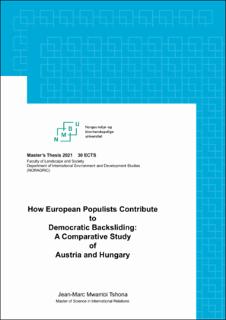| dc.contributor.advisor | Kaunert, Christian | |
| dc.contributor.advisor | Leonard, Sarah | |
| dc.contributor.advisor | Hansen, Stig Jarle | |
| dc.contributor.author | Tshona, Jean Marc Mwambi | |
| dc.coverage.spatial | Europe | en_US |
| dc.date.accessioned | 2022-01-11T11:32:39Z | |
| dc.date.available | 2022-01-11T11:32:39Z | |
| dc.date.issued | 2021 | |
| dc.identifier.uri | https://hdl.handle.net/11250/2836886 | |
| dc.description.abstract | There has been a universal trend towards democratic backsliding in weakly consolidated democracies and advanced and long-established democracies. A commitment to its founding principles of democracy and the rule of law in several member states has declined. This thesis investigates how populists contribute to democratic backsliding in Austria and Hungary by analyzing the media, judiciary, and corruption. Populism refers to a mobilization characterized by a politics of personality centered on a charismatic leader who is perceived to embody the people's will and who is said to speak on their behalf. The EU is an easy target and a popular "punch bag" for populist rhetoric because it is perceived as an exogenous political system controlled by a technocratic elite lacking legitimacy. EU has become a crucial battleground between populists and non-populist forces over the future of the constitutional state. Suppose democratic backsliding involves a movement away from democracy, the definition of democracy matters. This thesis understands democratic backsliding av movement away from liberal democracy. Like other governments, populists seek to implement their policies through public administration and government bureaucracies. The thesis finds that in both Austria and Hungary, the media and the judiciary came under attack. In Austria, a political scandal revealed the extent of high-level corruption. Corruption has been a characteristic of the Hungarian government. The thesis also finds that Austrian populists are being held accountable for contributing democratic backsliding through the rule of law, whereas Hungarian populists have successfully contributed to democratic backsliding without being held accountable. | en_US |
| dc.language.iso | eng | en_US |
| dc.publisher | Norwegian University of Life Sciences, Ås | en_US |
| dc.rights | Attribution-NoDerivatives 4.0 Internasjonal | * |
| dc.rights.uri | http://creativecommons.org/licenses/by-nd/4.0/deed.no | * |
| dc.subject | Populism | en_US |
| dc.subject | Democracy | en_US |
| dc.subject | EU | en_US |
| dc.subject | Austria | en_US |
| dc.subject | Hungary | en_US |
| dc.title | How European populists contribute to democratic backsliding : a comparative study of Austria and Hungary | en_US |
| dc.type | Master thesis | en_US |
| dc.subject.nsi | VDP::Samfunnsvitenskap: 200::Statsvitenskap og organisasjonsteori: 240::Sammenlignende politikk: 241 | en_US |
| dc.source.pagenumber | 100 | en_US |
| dc.description.localcode | M-IR | en_US |

